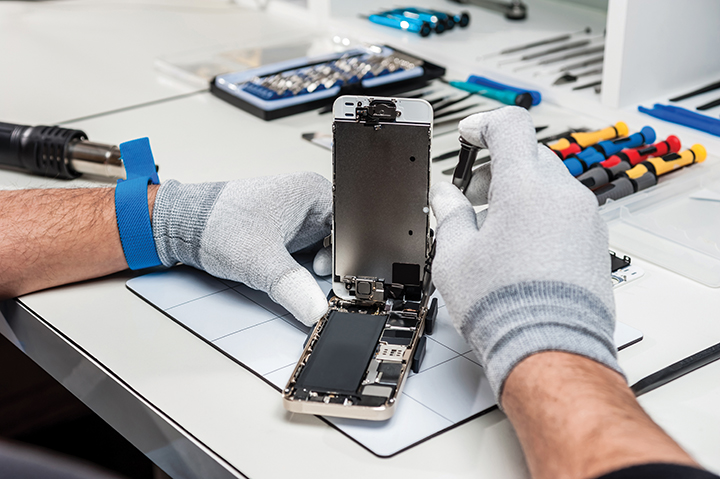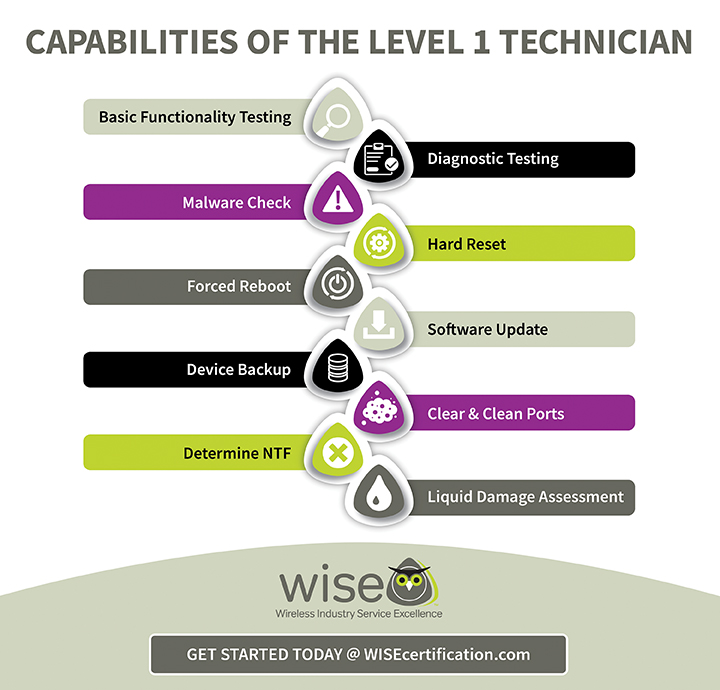Creating the Standard for the Aftercare of Mobile Devices
By Michelle James, CTIA - The Wireless Association
How CTIA-The Wireless Association, rallied the industry to raise the bar in reverse logistics
Let’s face it. Reverse logistics is a challenge in all industry segments, and mobile device reverse logistics isn’t any less complicated. Late 2017, the wireless industry association, CTIA, established the Reverse Logistics & Services Quality (RLSQ) program to build working groups to address common issues throughout the reverse supply chain for smartphones. The goal of the RLSQ program is to rally the mobile eco-system to collaborate on best practices, guidance, and certification pathways where appropriate by establishing voluntary standards that are created by the industry for the industry.
The mobile industry is deep with multiple stakeholders. Consumers are, of course, the most important stakeholder. Consumer trust throughout the lifecycle journey of their device is critical. Since the journey of a device can take multiple pathways, there are many stakeholders in the supply chain who touch a single device throughout its journey. Fast-changing demand for various secondary market devices also adds strain. The RLSQ Leadership Council, formed as a steering committee to address these common industry challenges, is comprised of OEMs, network operators/carriers, service retailers, remanufacturing service facilities, 3PLs, on-demand technician organizations and others. The Council agreed upon five core areas to address common industry challenges including the following topics: grading scales, service facility certification (depots), technician certification, retail service provider certification, and parts traceability.

The core common topic areas led to working group charters, where the real work began to create standards. Through industry consensus and more than 50 wireless companies of all sizes and various expertise supporting the aftercare of devices, we marched forward over many meetings to frame a foundation for transparency, integrity, definitions and criteria for a better customer excellence experience. When any supply chain can speak the same language, through agreed upon terminology and common understanding of best practices through shared cross-industry knowledge, the entire industry wins. Most importantly, the customer wins when processes are in place that support operating with greater efficiency.
Establishing grading scales is an important initiative the entire mobile industry benefits. For years, there were arbitrary criteria and definitions established between buyers and sellers of secondary mobile devices across various trading partners. Definitions were not grounded in engineering terms and certainly not universally adopted. Best practice methodology for how each device was graded was not consistent. Even common lexicon for defining the actual surface areas for cosmetic grading varied and consensus on what constitutes a fully functional device was harder to define than you would imagine. Notoriously, there were stories between buyers’ and sellers’ ongoing disappointment in believing they were trading A-grade product that was often B-grade or worse with definitions so widely different. The industry came together to create a collaborative criteria and definitions for device grading and published it for the entire industry to utilize. The goal is not to police the industry in any way, it is a document that can be adopted by the industry built by the industry and utilized voluntarily as a central point of criteria and definition guidance.
Simultaneously, a dedicated working group took on the task of establishing recommended baseline requirements for facilities, often referred to as a ‘depots’ in reverse logistics, to shore up expectations for operational excellence in facilities performing reclamation, refurbishment and remanufacturing of devices. The CTIA Authorized Service Center Program was born. This program certifies facilities that meet the highest quality and security standards, enabling the supply chain to provide high-quality pre-owned wireless devices to consumers. Facilities that qualify for CTIA Authorized Service Center certification must maintain a high level of service quality and possess ISO 9001 accreditation and SERI R2 certification. They must also maintain strong physical and data security standards and agree to regular auditing to ensure continued commitment to quality and security. Global Resale, based in Austin, TX became the program’s first certified facility early this year.
One glaring gap across the entire eco-system which included aftercare service centers as well as consumer facing service expectations was how to qualify mobile device repair technicians. They were everywhere, starting repair businesses in their dorm room to fixing phones in retail storefronts, to techs on wheels, to folks working on an assembly line inside service facilities. Yet, there had never been a recognized industry standard developed to legitimize this important skillset, nor one that the entire industry could collectively adopt. Several private training and certification companies had been established, but each represented independent business models, and some were sales funnels to other product engagements for their students. This working group brought together companies across OEMs, carriers, service centers, retailers, and others to create the baseline for a technician certification. The goal was to make this certification equally accessible to anyone, no matter where they performed device repair. This program was branded, WISE™ Certification, which stands for Wireless Industry Service Excellence. The program educates and tests wireless device repair technicians on industry-recognized standards, certifying those that meet the highest standards for service quality and technical skill knowledge. Today, we proudly have more than 10,000 technicians on our learning platform since we launched the program last year. In a crowded marketplace, and especially now with many repair operations deemed essential workers due to the COVID-19 crisis, having trusted technicians keeping us connected is critical.

Next, the working groups turned to consumer channels with a team called “Retail & Mobile Service Excellence” to begin to address standards that could be implemented in a retail environment to enhance consumer trust. The group, once again made up of a cross-section of the entire eco-system, to identify what requirements define a quality repair retailer or quality on-demand organization. We launched the WISE™ Authorized Service Provider (ASP) Program. The ASP program creates a network of certified retail locations, helping consumers identify qualified providers that meet the highest standards for service quality and wireless device repair. Certified retail locations must meet defined operational safety measures, security, device diagnosis and triage processes. Participating WISE ASP certified locations are also required to have WISE Certified technicians on staff with at least one certified technician during posted hours. Even in the face of COVID-19 this year, we have onboarded almost 1,000 stores nationwide, with hundreds in the queue progressing through the auditing process. National franchise operations and several independent stores were early to adopt the program this year, including; Batteries Plus Bulbs, uBreakiFix, Cell Phone Repair (CPR), iFixOmaha, FixIt Mobile, to name a few.
Forward-looking, a next topic area the working groups are exploring is parts traceability. More specifically, the group is evaluating how tracking OEM batteries throughout the supply chain could benefit the channel and consumers. This working group is helping to define potential future processes the channel might work better together for confidence in knowing the device is powered by a certified battery without physically opening the device. The objective would be for greater transparency throughout the marketplace identifying quality replacement batteries throughout the lifecycle of a device. The consumer electronics manufacturers also have expressed interest in this effort, as well as other stakeholders in various mobile product categories. This work will be a longer arc perhaps than some of the common industry challenges addressed so far, however certainly with no less energy in this effort that any other initiative the RLSQ program has deployed since launch.
It is very exciting to see an important industry segment come together to address common supply chain, reverse logistics and overall customer satisfaction with such enthusiasm. Consensus and collaboration in any standard-setting arena is never for the faint of heart. The effort by all those who have participated, collaborated, and committed their bandwidth to bring this program to life has been an exciting chapter for the wireless eco-system and one we trust will continue to evolve.
LinkedIn: https://www.linkedin.com/company/wise-certification/
Facebook: https://www.facebook.com/WISECertification
Twitter: https://twitter.com/wisecert
YouTube: https://www.youtube.com/channel/UCpgKKEvkAfEaK8U6AlBLFWA
 Michelle James
Michelle JamesWith over 20 years’ experience in marketing, retail and wireless, Michelle James is no stranger to building things from the ground up. After 8 years spent creating innovative sales solutions and in-store campaigns as Marketing Director for Levi Strauss & Co., Michelle lived “a marketer’s dream” as part of the team that helped mobile phone company Nokia climb to #1 global market share. Since then, Michelle has supported wireless retailers nationwide in community building, event production, brand management. For the past five years she has rallied the entire wireless repair community together to facilitate industry recognized standards impacting greater efficiencies in the reverse logistics supply chain for wireless devices. Aftercare of wireless devices should no longer be an afterthought in the overall lifecycle of device management.